Papers by Dr. Alison Binger
Education in a distance learning environment has a larger diverse population than in-person class... more Education in a distance learning environment has a larger diverse population than in-person classrooms which creates the need for greater cultural competency with online faculty (National Center for Education Statistics, 2022). Educators recognize the need for cultural awareness and the importance of it in the classroom (Batey & Lupi, 2012; Cushner, 2007) yet research indicates that their limited knowledge prevents it from reflecting within their classroom practices (Moore McBride, Lough, & Sherrard Sharraden, 2012). Educators with an awareness of culture shape their teaching practices to the individual student (Binger, 2018). This paper discusses the importance of world views and inclusive teaching and learning practices that embraces differences in gender, age, economics, culture, and faiths.

The Impact of a Transformative Intercultural Experience on Returned Peace Corps Volunteer Teachers' Instructional Practices
ProQuest LLC eBooks, 2018
The Impact of a Transformative Intercultural Experience on Returned Peace Corps Volunteer Teacher... more The Impact of a Transformative Intercultural Experience on Returned Peace Corps Volunteer Teachers’ Instructional Practices by Alison Binger MEd, Kutztown University 2002 BS, Kutztown University, 2000 Dissertation Submitted in Partial Fulfillment of the Requirements for the Degree of Doctor of Philosophy Global and Comparative Education Walden University October 2018 Abstract Teachers are being asked to implement cultural awareness into their instruction in the 21 century classroom, yet many lack the requisite knowledge and skills to accomplish this. The purpose of this inquiry was to explore the perceptions of teachers who are returned Peace Corps volunteers (RPCV) regarding what in their long-term international experience influenced them to include cultural awareness in their instruction. Bennett’s developmental model of intercultural sensitivity and Mezirow’s transformative learning theory were the conceptual frameworks. The research questions for this qualitative study asked how a long-term international volunteering experience impacts teachers’ pedagogy and what instructional practices RPCV teachers consider to be influenced by their Peace Corps experience. From 11 interviews, codes were identified and categorized into patterns and themes. There were three key findings. The first was that teachers who are RPCVs recognized their Peace Corps experience provided them with a deep cultural experience that brought about the realization of their own culture. The second was their recognition of their ability to adapt to cultural differences more easily than before they had their Peace Corps experience. The final finding was that RPCV teachers choose to use deep and engaging teaching practices with varied approaches, forms, styles, and subject matter in their classrooms upon their return to the United States. Given the current problem of preservice teachers entering teaching jobs with a lack of cultural understanding, these findings could contribute to positive social change by providing a practical approach for policy makers and universities to increase attention to promoting international volunteering and implementing cultural awareness in their curriculum.Teachers are being asked to implement cultural awareness into their instruction in the 21 century classroom, yet many lack the requisite knowledge and skills to accomplish this. The purpose of this inquiry was to explore the perceptions of teachers who are returned Peace Corps volunteers (RPCV) regarding what in their long-term international experience influenced them to include cultural awareness in their instruction. Bennett’s developmental model of intercultural sensitivity and Mezirow’s transformative learning theory were the conceptual frameworks. The research questions for this qualitative study asked how a long-term international volunteering experience impacts teachers’ pedagogy and what instructional practices RPCV teachers consider to be influenced by their Peace Corps experience. From 11 interviews, codes were identified and categorized into patterns and themes. There were three key findings. The first was that teachers who are RPCVs recognized their Peace Corps experience provided them with a deep cultural experience that brought about the realization of their own culture. The second was their recognition of their ability to adapt to cultural differences more easily than before they had their Peace Corps experience. The final finding was that RPCV teachers choose to use deep and engaging teaching practices with varied approaches, forms, styles, and subject matter in their classrooms upon their return to the United States. Given the current problem of preservice teachers entering teaching jobs with a lack of cultural understanding, these findings could contribute to positive social change by providing a practical approach for policy makers and universities to increase attention to promoting international volunteering and implementing cultural awareness in their curriculum. The Impact of a Transformative Intercultural Experience on Returned Peace Corps Volunteer Teachers’ Instructional Practices by Alison Binger MEd, Kutztown University, 2002 BS, Kutztown University, 2000 Dissertation Submitted in Partial Fulfillment of the Requirements for the Degree of Doctor of Philosophy Global and Comparative Education Walden University October 2018 Dedication My work is dedicated to my three young daughters, Chloe, Kya, and Jasmine, their futures, and to all the future globetrotting children of the world. You inspire me to be my best and to create a better world. I love you with all my heart and soul. Acknowledgments I would like to extend my deepest appreciation to everyone who helped me work through this dissertation process. To my committee chair, Dr. Bonnie Mullinix for her guidance and support throughout my studies at Walden University. You inspire me with your wisdom, your passion, your openness, your worldly experience and ethnorelative perspective,…
Distance Learning Administration Conference, 2023
Education in a distance learning environment has a larger diverse population than in-person class... more Education in a distance learning environment has a larger diverse population than in-person classrooms which creates the need for greater cultural competency with online faculty (National Center for Education Statistics, 2022). Educators recognize the need for cultural awareness and the importance of it in the classroom (Batey & Lupi, 2012; Cushner, 2007) yet research indicates that their limited knowledge prevents it from reflecting within their classroom practices (Moore McBride, Lough, & Sherrard Sharraden, 2012). Educators with an awareness of culture shape their teaching practices to the individual student (Binger, 2018). This paper discusses the importance of world views and inclusive teaching and learning practices that embraces differences in gender, age, economics, culture, and faiths.
Journal of Educational Research & Practice, 2021
This paper discusses the ways that community connections serve to sustain and support scholarly g... more This paper discusses the ways that community connections serve to sustain and support scholarly growth, retention, and success, particularly in longer-term online contexts. These strategies are seen through the reflective experience of a faculty mentor and two recent graduates who co-developed community support strategies that help doctoral students stay motivated, connected, and succeed over many years of what might otherwise be a long, individual, and lonely journey-particularly when undertaken online. A matrix of strategies, apps, and online tools emerged from this process and is offered for consideration.
This paper examines effective and practical techniques to learning multiple languages through the... more This paper examines effective and practical techniques to learning multiple languages through the perspectives and experiences of polyglots. Three interviews and three questionnaires were examined to find similarities in their methods of learning multiple languages. We found that participants perceptions of the world shifted through the language learning process. The participants recognition of systematic structural differences of languages through survival, flexibility in their thinking, and a genuine interest to understand a new culture led to them shift their perspectives from monocultural to multicultural as they progressed through the language learning process. A list of techniques that assisted the participants in their ability to see the world multiculturally is provided.
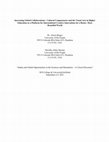
St Francis de Sales College, 2021
Cultural competency is the ability to interact respectfully and effectively with different cultur... more Cultural competency is the ability to interact respectfully and effectively with different cultures (Binger & Lees, 2021; University of Sidney, 2021). Increased cultural competency has become important in recent years due to our global connection through technology and issues with inequality, prejudice, and breakdowns in communication (Mareno & Hart, 2014). Global collaboration increases the chances of finding sustainable solutions for growth and survival (Tohidi & Jabbari, 2012). To increase the quality of education, the arts should be a regular part of primary through higher education curriculum (Kuyumcu, 2012). Art programs provide students with effective communication skills (Roosen, Klockner, & Swim, 2018) and increases creativity (Parker, J.S., 2008) to assist in the generation of innovative ideas (Berns, 2010; Neto, Filipe, & Caleiro, 2019). In this article, we provide simple cultural competency skills and provide visual art program ideas that will allow quicker movement into becoming creative and innovative people in school systems around the world. With a deep understanding of cultural competency embedded into our communication, global collaborations based on creativity and leading to innovation have a larger possibility of flourishing.
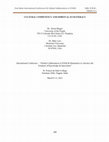
One Week International Conference on Global Collaboration in STEM & Humanities to Advance the Frontiers of Knowledge & Innovation, 2021
Cultural competency has become a topic in recent years due to an increased globalized society and... more Cultural competency has become a topic in recent years due to an increased globalized society and issues with inequality, bias, and a breakdown in intercultural communication (Mareno& Hart, 2014). When people are faced with cultural differences, they may experience uncomfortableness and may experience stages of egocentrism before developing into ethnorelativism (Bennett, 2012). Spiritual ecoliteracy provides purpose and meaning making in life learning through reading the world with the head, heart, hands, and spirit (Lees, 2017, 2021, 2021). In this article, we provide the elements of cultural competency and the methods used in ecoliteracy to increase cultural, spiritual, and ecological understandings. This article was a presentation on March 8 th , 2021 at the Global Collaborations in Science, Technology, Education,
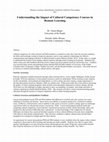
Disntance Learning Administration Annual & Conference Proceedings 2021, 2021
Cultural competency for online doctoral and MEd students is essential to ensure they learn the ne... more Cultural competency for online doctoral and MEd students is essential to ensure they learn the necessary attitudes, the skills and knowledge needed as leaders & educators, and to create authentic relationships for effective communication and learning with those of different belief systems (Mareno & Hart, 2014). In this study, we sought to understand the benefits of developing cultural sensitivity through remote learning environments. Students from online classes provided feedback about the positive impact increased cultural sensitivity had in their lives. Feedback was assessed using current and graduated remote learning PhD and MEd students at University of the People, Columbus State Community College, Walden University, and the Muslim Students Association. The results showed an increase in cultural understanding, cultural interest, and equity.
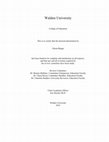
Walden University, 2018
Teachers are being asked to implement cultural awareness into their instruction in the 21st
centu... more Teachers are being asked to implement cultural awareness into their instruction in the 21st
century classroom, yet many lack the requisite knowledge and skills to accomplish this. The purpose of this inquiry was to explore the perceptions of teachers who are returned Peace Corps volunteers (RPCV) regarding what in their long-term international experience influenced them to include cultural awareness in their instruction. Bennett’s developmental model of intercultural sensitivity and Mezirow’s transformative learning theory were the conceptual frameworks. The research questions for this qualitative study asked how a long-term international volunteering experience impacts teachers’ pedagogy and what instructional practices RPCV teachers consider to be influenced by their Peace Corps experience. From 11 interviews, codes were identified and categorized into patterns and themes. There were three key findings. The first was that teachers who are RPCVs recognized their Peace Corps experience provided them with a deep cultural experience that brought about the realization of their own culture. The second was their recognition of their ability to adapt to cultural differences more easily than before they had their Peace Corps experience. The final finding was that RPCV teachers choose to use deep and engaging teaching practices with varied approaches, forms, styles, and subject matter in their classrooms upon their return to the United States. Given the current problem of preservice teachers entering teaching jobs with a lack of cultural understanding, these findings could contribute to positive social change by providing a practical approach for policy makers and universities to increase attention to promoting international volunteering and implementing cultural awareness in their curriculum.








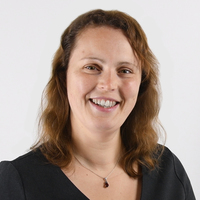

Uploads
Papers by Dr. Alison Binger
century classroom, yet many lack the requisite knowledge and skills to accomplish this. The purpose of this inquiry was to explore the perceptions of teachers who are returned Peace Corps volunteers (RPCV) regarding what in their long-term international experience influenced them to include cultural awareness in their instruction. Bennett’s developmental model of intercultural sensitivity and Mezirow’s transformative learning theory were the conceptual frameworks. The research questions for this qualitative study asked how a long-term international volunteering experience impacts teachers’ pedagogy and what instructional practices RPCV teachers consider to be influenced by their Peace Corps experience. From 11 interviews, codes were identified and categorized into patterns and themes. There were three key findings. The first was that teachers who are RPCVs recognized their Peace Corps experience provided them with a deep cultural experience that brought about the realization of their own culture. The second was their recognition of their ability to adapt to cultural differences more easily than before they had their Peace Corps experience. The final finding was that RPCV teachers choose to use deep and engaging teaching practices with varied approaches, forms, styles, and subject matter in their classrooms upon their return to the United States. Given the current problem of preservice teachers entering teaching jobs with a lack of cultural understanding, these findings could contribute to positive social change by providing a practical approach for policy makers and universities to increase attention to promoting international volunteering and implementing cultural awareness in their curriculum.
century classroom, yet many lack the requisite knowledge and skills to accomplish this. The purpose of this inquiry was to explore the perceptions of teachers who are returned Peace Corps volunteers (RPCV) regarding what in their long-term international experience influenced them to include cultural awareness in their instruction. Bennett’s developmental model of intercultural sensitivity and Mezirow’s transformative learning theory were the conceptual frameworks. The research questions for this qualitative study asked how a long-term international volunteering experience impacts teachers’ pedagogy and what instructional practices RPCV teachers consider to be influenced by their Peace Corps experience. From 11 interviews, codes were identified and categorized into patterns and themes. There were three key findings. The first was that teachers who are RPCVs recognized their Peace Corps experience provided them with a deep cultural experience that brought about the realization of their own culture. The second was their recognition of their ability to adapt to cultural differences more easily than before they had their Peace Corps experience. The final finding was that RPCV teachers choose to use deep and engaging teaching practices with varied approaches, forms, styles, and subject matter in their classrooms upon their return to the United States. Given the current problem of preservice teachers entering teaching jobs with a lack of cultural understanding, these findings could contribute to positive social change by providing a practical approach for policy makers and universities to increase attention to promoting international volunteering and implementing cultural awareness in their curriculum.